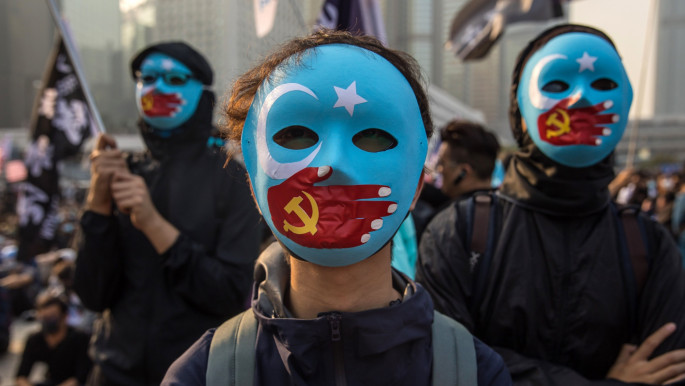China in the Middle East: Tourism and soft power
Officials in Beijing have poured hundreds of billions of dollars into the Belt and Road Initiative (BRI), a project to cement China's economic hegemony in the Global South by funding the construction of infrastructure in Africa, Asia, and even Europe and South America. The spread of the coronavirus, however, has undermined a years-long Chinese effort to reshape the new world order with soft power.
No aspect of China's campaign has suffered more than tourism, a lesser-known link between the East Asian world power and the Greater Middle East. While Chinese tourists in Indonesia, Italy, South Africa, and the United States have received plenty of press, their compatriots who opted to travel to North Africa and West Asia have attracted far less interest from the news media.
In 2018, 875,000 Chinese visited the Emirati megacity of Dubai. That same year, another half a million tourists from China went to Egypt, and 400,000 Chinese made the trip to Turkey, which expressed its desire to increase that number to a million.
In the last days of 2019, before the coronavirus had spread across the world, analysts predicted that Chinese visitors to the Arab side of the Gulf would total 2.2 million by 2023. The pandemic has jeopardised this touristic cooperation between China and its allies in the Greater Middle East.
 |
From the Maghreb to the Persian Gulf, China has invested its vast financial resources in building alliances that will anchor its sphere of influence in the Greater Middle East |  |
Prior to the ongoing outbreak, many countries in North Africa and West Asia not only depended on tourism but also looked to China as an opportunity to diversify their foreign visitors. Tourists and the industries that they sustained accounted for 19 percent of Morocco's economy in 2018. In 2016, the kingdom announced visa-free travel for Chinese tourists, leading their numbers to grow from 10,000 in 2015 to 132,000 in 2018, a spike of over tenfold.
Morocco expected to attract 500,000 Chinese tourists in 2020, but the coronavirus has dashed those hopes. As Sinophobia has risen across the world and China remains one of the few countries to have brought the outbreak under control, citizens of the East Asian world power have little incentive to go abroad.
 |
|
| Read more: Covid-19 diplomacy: Mapping China's Health Silk Road in the Middle East |
Chinese leaders have also made travel more difficult, limiting international flights to once a week. If China's wealthy travellers are declining to return to nearby tourist destinations such as Bangkok and Taipei, Chefchaouen looks that much less likely.
In addition to hindering the economic growth of China's client states in North Africa and West Asia, the drop in tourism will deprive China of the financial leverage that it has wielded over the countries in the Greater Middle East that have refused to back its agenda.
After Turkey criticised China's treatment of Muslims in 2015, officials in Beijing retaliated by warning Chinese tourists against visiting Turkey. Turkish officials have since refrained from issuing similar criticism.
Though China has in general pursued a foreign policy of non-interference in the domestic affairs of its trading partners, officials in Beijing have leveraged their economic power to guarantee that countries comply with their geopolitical objectives.
Many of China's partners in the Middle East have ignored or even praised the East Asian world power's poor record on human rights and its persecution of Muslims in particular. Taiwan, an island country that China claims as a province, has also struggled to make inroads in the region because of China's influence there.
 |
Many of China's partners in the Middle East have ignored or even praised the East Asian world power's poor record on human rights and its persecution of Muslims in particular |  |
The regional powers of North Africa and West Asia only proved willing to overlook a Chinese foreign policy that pushed peremptory norms because they saw China as a business partner.
The damage that the coronavirus has done to China's economy - plus the sudden drop in tourism that resulted - has brought this alliance into doubt. If Chinese officials have nothing to offer, Qatar, Saudi Arabia, and their neighbours will drift further into the US's sphere of influence.
 |
|
| Read more: Modern slavery and retail: UK cotton imports from China under scrutiny over forced Uighur labour |
Beyond reinforcing the US's role as the ultimate kingmaker in the Middle East, the coronavirus has provided a regional opening to China's Asian competitors. India, Japan, and South Korea all send tourists to the Middle East, and they will likely try to capitalise on the decline in Chinese travellers.
In fact, India has already launched an even more ambitious campaign to court visitors from the Middle East; South Korea has been leading a similar push since last year. Taiwan too has framed itself as the ideal tourist destination for Muslims paying a visit to Asia.
No country in Asia can match China's financial arsenal, which has underpinned its liberal use of soft power in the Middle East and remains resilient even after the coronavirus. Still, China will struggle to repair the economic and reputational damage caused by the outbreak.
Meanwhile, the East Asian world power's rivals will have more than enough time to develop their own spheres of influence in the Middle East. Tourism will form a crucial component of any such strategy.
Austin Bodetti studies the intersection of Islam, culture, and politics in Africa and Asia. He has conducted fieldwork in Bosnia, Indonesia, Iraq, Myanmar, Nicaragua, Oman, South Sudan, Thailand, and Uganda. His research has appeared in The Daily Beast, USA Today, Vox, and Wired



